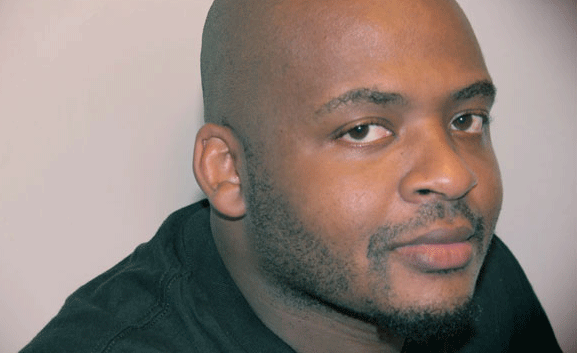Guest Lecturer Kiese Laymon Sparks Conversation About Opression at Colgate

“I’ve had guns pulled on me by four people under Central Mississippi skies: once by a white undercover cop, once by a young brother trying to rob me for the leftovers of a weak work-study check, once by my mother and twice by myself. Not sure how or if I’ve helped many folks say yes to life, but I’ve definitely aided in few folks dying slowly in America, all without the aid of a gun.”
Associate Professor of English and Africana Studies at Vassar College Kiese Laymon, read the beginning to his essay titled “How to Slowly Kill Yourself and Others in America” as he stood at the front of Persson Auditorium on the afternoon of Thursday, February 5. The essay is Laymon’s personal narrative, as a black writer born in Jackson, Mississippi, struggling against physical and structural violence.
Laymon began with this story of racism, ignorance, sexual violence and modern America as context for a discussion of how Colgate’s community sees these phenomena play out in our lives.
“Easy remedies like eating your way out of sad, or lying your way out of sad, or slanging your way out of sad, or robbing your way out of sad, or gambling your way out of sad, or shooting your way out of sad are just slower, more acceptable ways for desperate folks and especially paroled black boys in our country to kill ourselves and others close to us in America,” Laymon said.
Following Laymon’s speech, the crowd shared experiences, calls for action and concerns about how to fight the structures of oppression that are “slowly killing” many of us. The conversation felt like a continuation of last semester’s calls for Colgate to consider our complicity, stemming from a deep frustration that nothing had changed.
“Your story is the story of so many other people of color in this room,” senior Kori Strother said to Laymon as the discussion began. “Why is it that it’s so silent, and how do we get to a point where we can actually talk?”
Senior Mari Faines echoed the frustration.
“What is this hope that I’m supposed to feel when any day there’s someone who wants to kill someone who looks like my father? Who looks like my mother? My education can only go so far because the color of your skin is going to come first,” Faines said.
A common sentiment was that Colgate, rather than helping students to find ways to resist oppression, is instead allowing it to continue.
“We’re uncomfortable with being
vulnerable with each other, and with sharing,” junior Monica Hoh said.
A brief article risks simplifying these painfully urgent conversations down to palatable sound bites – Colgate students and administrators gathered in this same auditorium in late October to discuss the campus and institutions’ dire need for self-examination. Laymon commended those who shared, but asked that we demand more from our community.
“What I just saw was absolute
brilliance and courage and wonder,” Laymon said. “But also I think what we just saw goes to the heart of this asymmetrical power relationship when we talk about these white institutions. Everyone who spoke, spoke from their heart, just now, looked black. But I’m sad that they felt they had to make this space theirs out of pain and confusion…People feel okay watching us emote. For us to move, we have to get beyond just watching. We have to get within the pain and the tiring and the sadness and the humiliation.”
Laymon highlighted how both
institutions and individuals often claim steps of progress without doing adequate self-reflection. Laymon spoke to a crowd that included students, many professors and administrators, including Provost and Dean of the Faculty Douglas Hicks sitting only a few rows from the podium.
“It is the responsibility of the institution, and by that I mean the administrators, to be better and to show better, to actually encourage lots and lots of public conversations where we tell the truth,” Laymon said.






